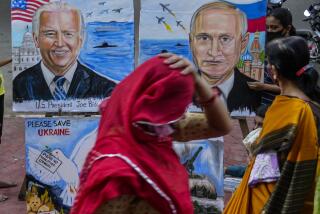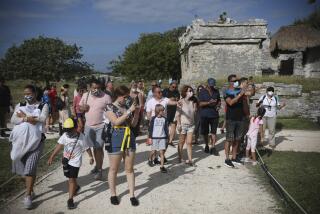Global Disconnect
- Share via
When I arrived in Aden, in southern Yemen, in the summer of 2001, I could hardly believe I had been there before -- in 1959, at the age of 2, when I was being taken by my mother from my hometown of Oxford, England, to hers, in Bombay.
Aden at that time was the largest port in the world outside Manhattan. It buzzed with the slightly illicit activity that erupts when West first touches East. Long governed by British India, and the main coaling station for all ships traveling between Britain and its far-flung possession in the East, it rightly imagined itself to be a center of the world.
By 2001, the town of 400,000 looked more broken than any place I had seen before. No cafes, no shops, no anythings but rubble and a few foraging goats. The British had left, literally overnight, in 1967, and the Russians had come in to take up the slack. But they too had left, in time, and civil war had followed civil war. In 1991, southern Yemen was reunited with its longtime enemy to the north; three years after reunification, it was fighting a war again against the north, caught up in a two-month siege.
Our television and computer screens and headlines remind us daily that we live closer to Yemen -- and to Tibet and Afghanistan and Kashmir -- than ever before; but in practice the gulf between “us” and “them” seems greater than it has ever been.
The gap between the richest 20% in the world and the poorest has, famously, doubled in the last 30 years; and yet, deeper than that, the very access we enjoy through computer screens and TV screens, even through ethnic stores in the neighborhood, encourages us to believe we have more in common than we do.
We speak, hopefully, of a “global village,” as if we were all assembled around a village green, rich with tribal elders and campfire meetings. In reality, my travels tell me, we live in a kind of planetary Los Angeles, where a few of us cower in our gated mansions while fires burn a few minutes -- and several lifetimes -- away in South Central.
Some years ago, I decided that it would be a crime for me not to make use of opportunities that no humans in history had ever enjoyed before. Suddenly, thanks to plane travel, those of us with the time and resources can go and see firsthand the Laos or Easter Island our grandfathers only dreamed about. People in those countries, sad to say, are rarely in a position to come and visit us, so it is up to us, if we have the chance, to go and see them. If truly we are living in a global neighborhood, then the first act of courtesy -- and of prudence -- is to go and see what the neighbors look like and believe.
What I found, inevitably, was a reality much more confounding than our newspapers had led me to believe, and a world that seemed unimaginably far from my comfortable home in Santa Barbara. The people in the nations sometimes touted as the official enemies of the United States, such as Cuba and Vietnam, longed to make contact with Americans. The people in Damascus were, not surprisingly, much more opposed to their government than even its longtime enemy in Washington was.
When I stepped off a plane in North Korea, I confronted a reality even more surreal than what I had read about in magazines; and what the North Koreans saw in me was a dark-complexioned, disheveled, not very menacing character who no doubt conflicted with their expectations of the United States.
We talk of how computers are linking us all together, but two-thirds of the people on the planet, when I was traveling, had never even used a telephone. We exult in the possibilities of the Internet, when what those in Cambodia most need is a mosquito net (which costs $5 and can save lives). In Bhutan, most people live -- by government mandate -- in 14th century-style houses, wearing 14th century-style clothes; in Easter Island, a 21st century luxury is a piece of wood. In Paraguay, half the goods on sale in the shops are stolen; in North Korea, all the radios are fixed so you can only hear one channel.
Travel does not infallibly broaden the mind, but it does, I think, remind us vividly of the limits of our knowledge.
Six weeks after I came back from Aden, terrorist planes flew into the World Trade Center, and suddenly we were reminded that Yemen (a country we had scarcely heard of the day before) was the epicenter of evil: the location of Osama bin Laden’s home village and the site of the attack on the U.S. destroyer Cole.
I, however, could recall the man who had gone out in the mountains after midnight to buy me a 7-Up and a bar of chocolate, and the veiled women in a tiny Internet cafe accessing images of America, where their loved ones lived. I remembered the children playing in the debris of exploded buildings and the hollow-cheeked old women hammering on the windows of my taxi with skinny arms. Our screens, our government, have told us that these people are the enemy; what I saw off-screen -- and away from the headlines -- suggested something very different.
More to Read
Sign up for The Wild
We’ll help you find the best places to hike, bike and run, as well as the perfect silent spots for meditation and yoga.
You may occasionally receive promotional content from the Los Angeles Times.






